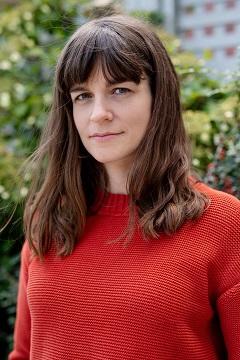
WB: Congratulations on winning the 2020 Fiddlehead Creative Nonfiction Contest. I sincerely enjoyed "Plagued" and am pleased to see it recognized.
This is, at times, a difficult piece to read. There's a frustrating sense of helplessness in both the characters' struggles to reconcile with the father's illness and in their flailing crusade against the moth infestation. Did you find it was also difficult to write?
MC: Yes and no. Writing it helped me make sense of experiences that I didn’t understand while they were happening and gave me a different way of looking at things. Because my father died just a few weeks before my daughter was born, it was a very intense time, and I didn’t have the capacity to even think about this period until recently. All I confidently remembered about it was my intense fixation on the moths, and a pervasive feeling of inadequacy and frustration. I needed to read notes I’d written from that time and talk to other people to start trying to piece together what happened when. And sometimes those things were painful to think about again.
It was also difficult to write just in a practical sense since I’ve been home for the last few months of the pandemic with two young children. So just carving out time to work was sometimes tricky. Lots of starts and stops.
WB: First, I’m sorry to read that your father did indeed pass. Though the essay doesn’t necessarily end optimistically, I had nevertheless hoped he had recovered. It’s clear he was a much beloved and valued member of your family.
I think this may be the most admirable feature of your essay: how easy it is to sympathize with and be moved by your characters. After all, the relationships we have with our parents can make for poignant life experiences, but it can be a tremendous challenge to evoke that poignancy in others. Were you aware, while writing, of how you might navigate this challenge?
MC: Thank you. I didn't consciously register this challenge as I was writing, but I was aware as I worked on the piece that I had an opportunity to approach the situation with more compassion than I felt at the time, when I was mostly frustrated and sometimes less patient than I would have liked. I had the safety and space of retrospection to explore the different ways we were all navigating the situation. In terms of my father's characterization, I was worried about having him seem more taciturn or closed off than he really was, and that's why I was pleased when I discovered my note about his dad and the ear cleaning story. I felt that it helped get a bit more at what he was like and maybe what he was going through.
WB: Though this essay's primary subject is the speaker's relationship with her father, it is granted an additional poignancy by her impending pregnancy. How do you see these two narrative braids intermingling and contextualizing each other?
MC: It’s strange but there were a lot of parallels between what my father and I were going through: both came with a certain helplessness, of being hostage to and alienated from biological processes beyond our control or conscious understanding. We both needed regular scans to tell us what was happening in our bodies. Of course, there were stark differences as well. Being pregnant was determined by so much anticipation: you’re always thinking about the next stage, what will happen when the baby is born, etc. But with my dad’s prognosis, there was this real desire to stay in the present, to avoid looking too far into the future.
There is also the connection that I only understood later, between the moth infestation and his illness. This idea of hidden malignancy and unchecked growth that can’t be seen or stopped. A need to find the source and eradicate it. And this also created a tension with the understanding of a (wanted) pregnancy.
WB: Perhaps our readers can recognize something in these themes of helplessness amid unfamiliar and uncontrollable circumstances.
Speaking of, can you speak more about writing during a pandemic? I imagine you are not alone in having struggled these past few months to invest in your craft. How were you able to carve out that time you needed, and what recommendations might you make to those of us who are still struggling in this way?
MC: Yes, I definitely see similarities between what was happening in my family then and what is going on right now with the pandemic. When so little is in your control you concentrate on these smaller things that you feel you should be able to do, like eradicating moths or baking sourdough (which I was also obsessed with and terrible at).
In terms of writing, I didn't have much time in the spring and summer to start anything new, so I used whatever time I found between naps and screen-time to work on pieces that I'd already started before the shutdown, such as this one. My partner's also been working from home since March so that's been helpful. However, I'm aware of how fortunate I am that I was even able to use my time this way, instead of trying to keep up with the demands of a full-time job on top of full-time parenting. My respect and admiration goes to people who are managing all of that, it's really hard and the burnout is real. When I could find the time and space to concentrate, writing became a way of carving out some much-needed time for myself, and provided a bit of respite from everything going on in the world. But it can be hard to find either of those things these days.
WB: Even if one can’t find the time or space, perhaps your earlier point about living in the present suggests the importance of self-compassion.
MC: Yes, definitely. It can be difficult right now to resist projecting too far into the future and imagining when things will return to "normal," what that will look like, etc. But it's also simultaneously impossible to make plans with any certainty, which can be challenging to our sense of self. Since things are changing so much day to day, living in the present is all we can do right now. Hopefully that does help us have a bit more compassion with ourselves and one another.
Plagued will be featured in our upcoming Fall Issue 285. Subscribe now to ensure you don't miss out!












Comments
Plagued
Add new comment